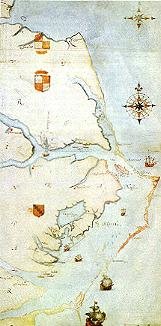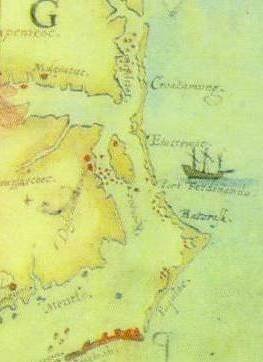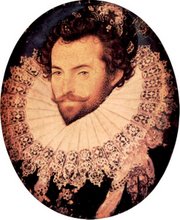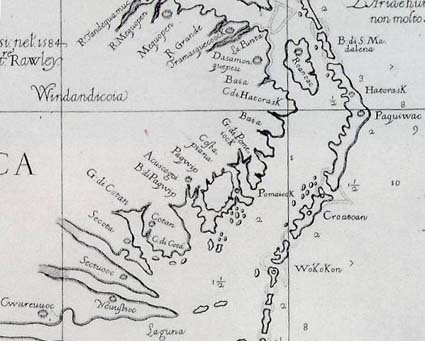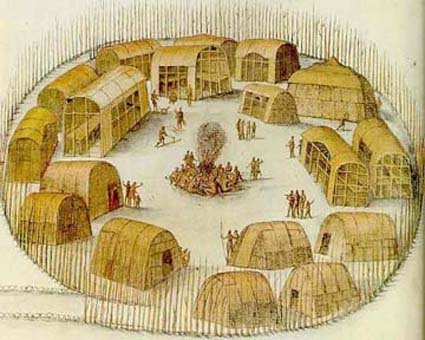http://news.ncdcr.gov/2011/07/27/state-library-of-n-c-announces-change-in-genealogical-research-services-hours-starting-sept-12/
This blog is © History Chasers
Click here to view all recent Lost Colony Research Group Blog posts
~ History ~ Genealogy ~ Archaeology ~
Posted by
Historical Melungeons
at
7/28/2011 10:28:00 AM
![]()
Labels: Genealogy archives, north carolina, research
by Roberta Estes
 Now for the great news - entrance to the Elizabethan Gardens is free that day in celebration of Virginia's birthday.
Now for the great news - entrance to the Elizabethan Gardens is free that day in celebration of Virginia's birthday.
Posted by
Historical Melungeons
at
7/26/2011 12:51:00 PM
![]()
Labels: lost colony, virginia dare

Posted by
Historical Melungeons
at
7/24/2011 12:57:00 AM
![]()
Labels: hatteras, lost colonists, roanoke
A: I hail from right here in Durham !
family tie to both. Would you mind telling everyone a little about their Outer Banks bloodline ?
http://hatgensoc.wordpress.com/2011/07/16/an-interview-with-anne-poole-co-founder-of-the-lost-colony-genealogy-and-dna-research-group/
This blog is © History Chasers
Click here to view all recent Lost Colony Research Group Blog posts
Posted by
Historical Melungeons
at
7/15/2011 10:11:00 PM
![]()
Labels: anne pool, croatoan hatteras, lost colony
This blog is © History Chasers
Click here to view all recent Lost Colony Research Group Blog posts
Posted by
Historical Melungeons
at
7/13/2011 05:21:00 PM
![]()
Labels: lost colony
This blog is © History Chasers
Click here to view all recent Lost Colony Research Group Blog posts
Posted by
Historical Melungeons
at
7/12/2011 05:15:00 PM
![]()
Labels: lost colony
DNA Heritage Transfers
Answers to questions for those who originally tested with DNA Heritage.
Cont. here:
http://www.familytreedna.com/faq/answers/default.aspx?faqid=40
This blog is © History Chasers
Click here to view all recent Lost Colony Research Group Blog posts
Posted by
Historical Melungeons
at
7/01/2011 05:06:00 PM
![]()

In the interest of a balanced viewpoint, this blog will occasionally publish op-ed articles by guest authors. These articles may not, necessarily, reflect the opinion of the editors.
Surname-Source
Allen -- Colonist roster
Alligood -- Families of Interest
Archard-- Colonist roster
Archard -- Families of Interest
Armstrong -- Families of Interest
Arthur -- Colonist roster
Austin -- Families of Interest
Bailie -- Colonist roster
Barber, Barbour -- Families of Interest
Barrow -- Families of Interest
Beasley -- Families of Interest
Bennet -- Colonist roster
Bennet -- Families of Interest
Berde -- Colonist roster
Berry -- Families of Interest
Berrye -- Colonist roster
Bishop -- Colonist roster
Blount -- Families of Interest
Borden -- Colonist roster
Boyd -- Families of Interest
Bragg -- Families of Interest
Bridger -- Colonist roster
Bridger -- Families of Interest
Bright -- Colonist roster
Bright -- Families of Interest
Brooke -- Colonist roster
Brooks -- Families of Interest
Browne -- Colonist roster
Bryant -- Families of Interest
Buck -- Families of Interest
Burden -- Colonist roster
Butler -- Colonist roster
Butler -- Families of Interest
Cage -- Colonist roster
Cahoon -- Families of Interest
Cain -- Families of Interest
Carawan -- Families of Interest
Caroon, Carron -- Families of Interest
Carrow -- Families of Interest
Chapman -- Colonist roster
Chapman -- Families of Interest
Chavis -- Families of Interest
Cherry -- Families of Interest
Cheven -- Colonist roster
Collins -- Families of Interest
Colman -- Colonist roster
Cooper -- Colonist roster
Cooper -- Families of Interest
Cotsmur -- Colonist roster
Cox -- Families of Interest
Crisp -- Families of Interest
Croom -- Families of Interest
Cuttler -- Families of Interest
Daniel -- Families of Interest
Dare -- Colonist roster
Darige -- Colonist roster
Darige -- Families of Interest
Dixon -- Families of Interest
Dorrell -- Colonist roster
Durrance -- Families of Interest
Durrant -- Families of Interest
Dutton -- Colonist roster
Earnest -- -- Colonist roster
Edwards -- Families of Interest
Elks -- Families of Interest
Ellis -- Colonist roster
Ellis -- Families of Interest
English -- Colonist roster
Evans --Families of Interest
Farre -- Colonist roster
Farrow -- Families of Interest
Fitspatric -- Families of Interest
Florrie -- Colonist roster
Forbs -- Families of Interest
Gaylord -- Families of Interest
Gibbes -- Colonist roster
Gibbs -- Families of Interest
Glane -- Colonist roster
Gramme -- Colonist roster
Griffin -- Families of Interest
Gurganus -- Families of Interest
Gurkin -- Families of Interest
Hardison -- Families of Interest
Harris -- Colonist roster
Harris -- Families of Interest
Harviem -- Colonist roster
Harvie -- Families of Interest
Harvye -- Colonist roster
Hassell --Families of Interest
Hawkins --Families of Interest
Hedgepath -- Families of Interest
Hemmington -- Colonist roster
Hewet -- Colonist roster
Hill -- Families of Interest
Hodges -- Families of Interest
Howe -- Colonist roster
Hudson -- Families of Interest
Humfrey -- Colonist roster
Hynde -- Colonist roster
Jackson -- Families of Interest
Jennette --Families of Interest
Jerkins -- Families of Interest
Johnson -- Colonist roster
Johnson -- Families of Interest
Jones -- Colonist roster
Jones -- Families of Interest
Kemme -- Colonist roster
Keys -- Families of Interest
King -- Families of Interest
Lasie -- Colonist roster
Lathan -- Families of Interest
Lawrence -- Colonist roster
Leary -- Families of Interest
Little -- Colonist roster
Long -- Families of Interest
Lowery -- Families of Interest
Lucas -- Colonist roster
Lucus -- Families of Interest
Mackey -- Families of Interest
Mann -- Families of Interest
Mannering -- Colonist roster
Martyn -- Colonist roster
Mayo -- Families of Interest
McCoy -- Families of Interest
Merrimoth -- Colonist roster
Midgette -- Families of Interest
Moor -- Families of Interest
Mullins -- Families of Interest
Myllet -- Colonist roster
Mylton -- Colonist roster
Newton -- Colonist roster
Nicholas -- Families of Interest
Nicholes -- Colonist roster
Nicols -- Families of Interest
Norman -- Families of Interest
Padgett -- Families of Interest
Pain -- Families of Interest
Paramore -- Families of Interest
Patrick -- Families of Interest
Pattenson -- Colonist roster
Payne -- Colonist roster
Payne -- Families of Interest
Perry -- Families of Interest
Phevans -- Families of Interest
Phevens -- Colonist roster
Philpatrick -- Families of Interest
Pierce -- Colonist roster
Pierce -- Families of Interest
Pinkham -- Families of Interest
Pollock -- Families of Interest
Powell -- Colonist roster
Powell -- Families of Interest
Prat -- Colonist roster
Pugh -- Families of Interest
Respass -- Families of Interest
Ricks -- Families of Interest
Rollinson -- Families of Interest
Rufoote -- Colonist roster
Russell -- Families of Interest
Salter -- Families of Interest
Sampson -- Colonist roster
Sawer -- Families of Interest
Scot -- Colonist roster
Scot -- Families of Interest
Shaberdge -- Colonist roster
Shephard -- Families of Interest
Simmons -- Families of Interest
Smart -- -- Colonist roster
Smith -- Colonist roster
Smith -- Families of Interest
Smart -- Colonist roster
Sole -- Colonist roster
Sparrow -- Families of Interest
Spendlove -- Colonist roster
Spenser -- Families of Interest
Squires --Families of Interest
Starte -- Colonist roster
Stevens -- Colonist roster
Stevens -- Families of Interest
Stilman -- Colonist roster
Stilman -- Families of Interest
Sutton -- Colonist roster
Sutton -- Families of Interest
Swann -- Families of Interest
Tan -- Families of Interest
Tappan --Colonist roster
Tarkington -- Families of Interest
Taverner -- Colonist roster
Taylor -- Colonist roster
Tetterton -- Families of Interest
Thomas -- Families of Interest
Tom, Toms -- Families of Interest
Tomkins -- Colonist roster
Topan -- Colonist roster
Tuley -- Families of Interest
Turner -- Families of Interest
Tydway -- Colonist roster
Viccars -- Colonist roster
Viccars -- Families of Interest
Wahab -- Families of Interest
Wallis -- Families of Interest
Warner -- Colonist roster
Warren -- Colonist roster
Warren -- Families of Interest
Waters -- Colonist roster
Waters -- Families of Interest
Welch(s) -- Families of Interest
White -- Colonist roster
White -- Families of Interest
Wildye -- Colonist roster
Wilkinson -- Colonist roster
Willes -- Colonist roster
Williams -- Families of Interest
Wood -- Colonist roster
Woolard -- Families of Interest
Wotton -- Colonist roster
Wright -- Colonist roster
Wyles -- Colonist roster
Wyles -- Families of Interest
Wythers -- Colonist roster
